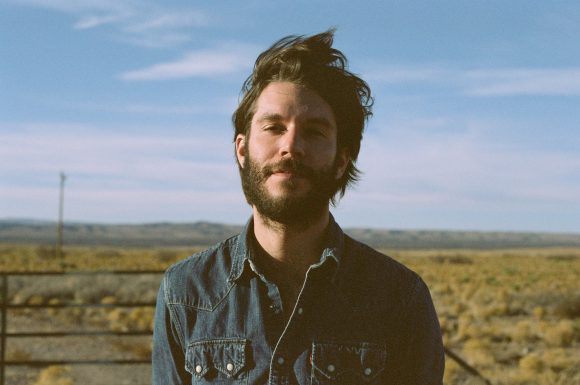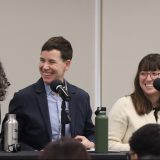
Career Corner: How Wilkinson College Helped Political Science Major Become a Hit Screenwriter
November 17, 2023

Erin Berthon, MA Career Advisor, Wilkinson College of Arts, Humanities, and Social Sciences, at Chapman University
When Nolan Dunbar (2010) graduated with a BA in Political Science with an emphasis in International Relations and a minor in History, he never expected to become a successful film writer. I had the opportunity to sit down with Nolan to talk about his career path and how Wilkinson College of Arts, Humanities, and Social Science helped prepare him for his dream job as a successful writer.
Erin Berthon: Tell me about your career path?
Nolan Dunbar: I’ve been intensely interested in film and TV for as long as I can remember, and I wrote a handful of short stories and screenplays when I was a teenager. I loved doing it, but I never seriously considered it as a career path until much later. I entered Chapman as a History major with a vague notion that I would attend law school or perhaps work at the State Department or CIA. I directed my education in that direction, switching my major to International Relations after a few semesters. In my sophomore year, I took a general writing course with Dr. Pamela Ezell in the English Department, where we explored an assortment of different writing formats — short story, short film, adaptation, journaling. She’s the first person I can remember encouraging me to pursue writing as a job. She even recommended me for a gig writing short articles in the early days of the blogosphere. I didn’t get the job, but the experience planted an important seed.
As I neared the end of my time at Chapman, I took Dr. Lori Cox Han’s excellent course on Mass Media Law, and it sparked an intense interest in constitutional law. I imagined a future where I’d take a year off after graduating from Chapman and continue onto law school, but before the end of my first post-graduate summer, there was no plan.
EB: Friends helped you land some gigs as a showrunner assistant to film producers, and you found a new career pathway. How did that work out?
ND: Showrunner’s assistant jobs are rare and difficult to come by because they place you about as close as you can get to the television writing process as you can get without being one of the writers. Joel [Wyman] knew I wanted to be a writer, so he would break up the day-to-day realities of being an assistant — booking travel, rolling calls, taking notes, getting coffee — with tiny little writing opportunities. A line of dialogue here, a small scene there — it wasn’t much, and he rewrote everything I did to the point of it being unrecognizable (and much better), but it was a fantastic learning opportunity. After a few years with Joel, I worked in the same capacity for a different showrunner on the CW series Arrow, quietly working on my own writing all the while.
Like so many jobs, television writing has a Catch-22 quality to it — you can’t get the job unless you have the necessary experience, and you can’t get the necessary experience unless you’re already in the job. There are still plenty of aspiring screenwriters who break into the industry by writing something brilliant and getting noticed, but that method hadn’t worked for me. Not having a formal education in screenwriting or production, I was able to educate myself via proximity, osmosis, and trial-and-error. The small writing assignments I received from my showrunner bosses grew little by little over the years until I was eventually given the opportunity to write an actual episode of Arrow, paving the way for countless career opportunities that would follow, including writing for Jack Ryan.
EB:3. How did your major, along with international relations and history, prepare you?
ND: My experience studying international relations and history at Chapman has been fundamental to my success as a screenwriter. Writing, in general, and screenwriting, in particular, draw heavily upon other skills and knowledge. It’s the writer’s job to suspend the disbelief of their audience and convince them that the characters and events in their work could be or once were real. As someone who loves to write about historical events and who draws lots of inspiration from historical figures, my education in history and politics is one of my most essential tools. It aids me in building a believable world populated by believable characters.
On a more fundamental level, history and politics also share quite a bit of DNA with screenwriting in the sense that they’re all grounded in the narrative. History is the means by which we record, analyze, and reflect upon the story of our past — our narrative. Politics could be viewed as how we incorporate our narrative into our value structure. Screenwriting and storytelling are distillations of these ideas.
The plot is essentially an edited version of the history of the story you’re telling, and a story’s conflict is often derived from the application of conflicting values — politics. Because of this, knowledge of history and politics has given me a sense of comfort and familiarity in the world of screenwriting that has paid dividends over and over again.
EB: For our students graduating during these unprecedented times, do you have any advice?
ND: If I could give any advice to students graduating during COVID times, it would be to never stop learning — whatever that looks like for you. It’s the perfect antidote against uncertain times. It’s not really comparable, but I graduated in 2010 in the midst of the recovery from the Great Recession. There were very few jobs, and the recession ate away at a core piece of the American dream — that if you got a job at a good company and put in a few decades, you could expect, at least, a comfortable middle-class existence with a family and a retirement.
The Great Recession threw that idea out the window. Corporations floundered, and many Americans were forced to shift careers at a time in their lives when they were looking toward retirement. What I noticed among my parents’ generation and my peers is that those who had the easiest time bouncing back from the difficulties of that challenging time were the ones who continued to learn and try new things.


